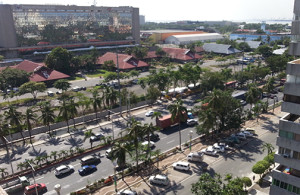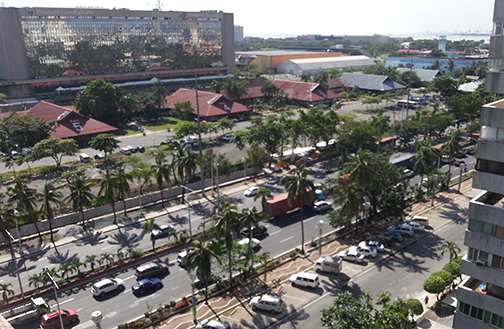 Manila’s truck ban and port congestion problems were among the reasons cited by businesses for their lower business confidence outlook in the third quarter of the year.
Manila’s truck ban and port congestion problems were among the reasons cited by businesses for their lower business confidence outlook in the third quarter of the year.
According to the results of the Business Expectations Survey of the Bangko Sentral ng Pilipinas for the third quarter, business confidence remained in positive territory with 34.4%, but it was down from 50.7% during the same period last year.
Respondents were less buoyant in their outlook due to expectations of seasonal slack in demand and interruption of business activities during the rainy season, reduced consumer spending following increased expenditures on education and the tax payments made in the previous quarter, increases in the prices of basic commodities, and higher overhead expenses as costs of raw materials and utilities rose.
They also traced the business slowdown partly to the truck ban and port congestion issues, as well as the political noise generated by the Priority Development Assistance Fund and Disbursement Acceleration Program issues.
Exporters, dual-activity firms, and importers in the survey said they were less optimistic in the third quarter as a result of the expected typical low demand as well as the disruption in business activities caused by the truck ban and port congestion issues and higher costs of utilities.
The survey was conducted from July 1 to August 15 among 1,527 firms nationwide.
BSP said the sentiment of businesses in the Philippines mirrored the less bullish outlook in the United Kingdom, Canada, Germany, New Zealand, Singapore, Hong Kong, and India, but contrasted with the more buoyant views of those in the United States and China.
On another note, businesses are more bullish going into the fourth quarter, with index rising to 52.9% from 48.9% in the same period in 2013.
The upbeat response comes from expectations of brisker business as consumers are expected to spend more over the holiday season; expansion in the retail trade, infrastructure, power and telecommunication, education, and health care businesses; higher exports of garments and metals with the recovery of global markets; and increase in orders for manufacturing products.
Moreover, BSP said the number of firms with expansion plans increased to 34.2% from 30% in the previous quarter.
The confidence index is computed as the percentage of firms that answered in the affirmative less the percentage of firms that answered in the negative about their views on a given indicator.





